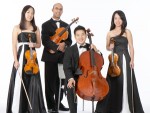Title
The Afiara String Quartet, recipient of the Lisa Arnhold Fellowship and designated The Juilliard School’s resident graduate string quartet, makes its Alice Tully Hall debut on May 5. The all-Canadian roster of Valerie Li and Yuri Cho, violins, David Samuel, viola, and Adrian Fung, cello, will be joined by guest artist, violist Michael Tree, a founding member of the Guarneri String Quartet, for a program of quartets by Beethoven and Shostakovich, and the Brahms String Quintet in G Major.
Body
One might be tempted to say that “Afiara” means “crowned with laurels” (the actual etymology shall be illuminated later), as there is scarcely a prize this young ensemble has not earned. The only Canadian ensemble in history to win the Concert Artists Guild International Competition and Munich’s ARD International Music Competition, the Afiara has performed this season at the Library of Congress and Weill Recital Hall at Carnegie Hall, and released its debut album last fall. The ensemble’s pedigree is flawless, having worked with members of the Alexander, Juilliard, Kronos, Emerson, and Takacs quartets. In addition, the members of Afiara participated as fellows in the Aspen Festival’s Center for Advanced Quartet Studies.
Founded in 2006, the quartet has thrived on a combination of commitment and good luck. “From the start, we were all committed to doing the quartet thing,” said Li in a recent interview. “We wanted to give it everything.”
Fung chimed in: “I think that was the hardest thing to do, especially when you’re in college, to find four people who are as crazy or as willing to commit.” (Members of the quartet have a charming habit of finishing each other’s stories.)
“After that,” continued Li, “it was just hard work.”
Hard work and a little cultivation from a professional ensemble, that is. In its early years, the group was nourished by studies with the Alexander String Quartet in a chamber music certificate program at San Francisco State University. “They gave us a lot of advice and help [with] everything,” Fung said. “Things that we wouldn’t learn in college, like how to speak to a presenter [or] what to do at a cocktail party. They were fantastic for us.”
The program at San Francisco State provided the ensemble with resources and flexibility. Fung remarked that they were given “a very generous stipend so we could work on our quartet craft and so we wouldn’t have to wait tables or gig.”
He added: “We were able to rehearse as much as we wanted. Back then it was four or five hours a day. We didn’t take weekends.”
Li noted that the graduate quartet program at Juilliard is similarly designed to foster a professional ensemble. While studying with the Juilliard String Quartet, the members of Afiara also hone their skills as teachers and collaborative artists. “We have a studio so we can rehearse when we’re in town. When the Juilliard Quartet is out of town, we take over coaching for their group,” Li said. “We also helped out a little with the string quartet survey class.”
This intensive training is ideal for the Afiara, which has serious long-term goals. They agree that they hope to be together for at least 10 or 20 years, and ultimately to achieve a faculty teaching position at a university or conservatory in addition to a major concert career. “Our goal is to have that happen sooner rather than later,” Samuel said.
Being on the same page is especially important for the members of the ensemble, whose relationships go further than those of many chamber music partners. Cho and Samuel are husband and wife, and Fung’s sister is married to Li’s brother, which makes this ensemble truly a family affair.
Which brings us to the quartet’s name. Fung explained that the ensemble’s christening was the result of a typo. “I was writing an e-mail to somebody saying something like, ‘This is going to be a grand event, a big affair,’ and it came out as ‘afiara,’” he said. “We were looking for a name at the time so I looked it up on Google … and it said ‘a fiara’ in Spanish could mean ‘in it trusted.’ The root word, fiar, to trust, we thought was really special to us, because you have to trust each other both in rehearsal and on stage and in every single business transaction. We felt that was an important thing to uphold.”
The group members are optimistic about the future, and despite an intensive travel, performance, teaching, and rehearsal schedule, report finding great joy in making music together. “I feel that we play better today than we did last week and that’s something that makes me really happy,” Fung said. “I’m very thankful every day for what we’re doing. It’s kind of a dream.”





